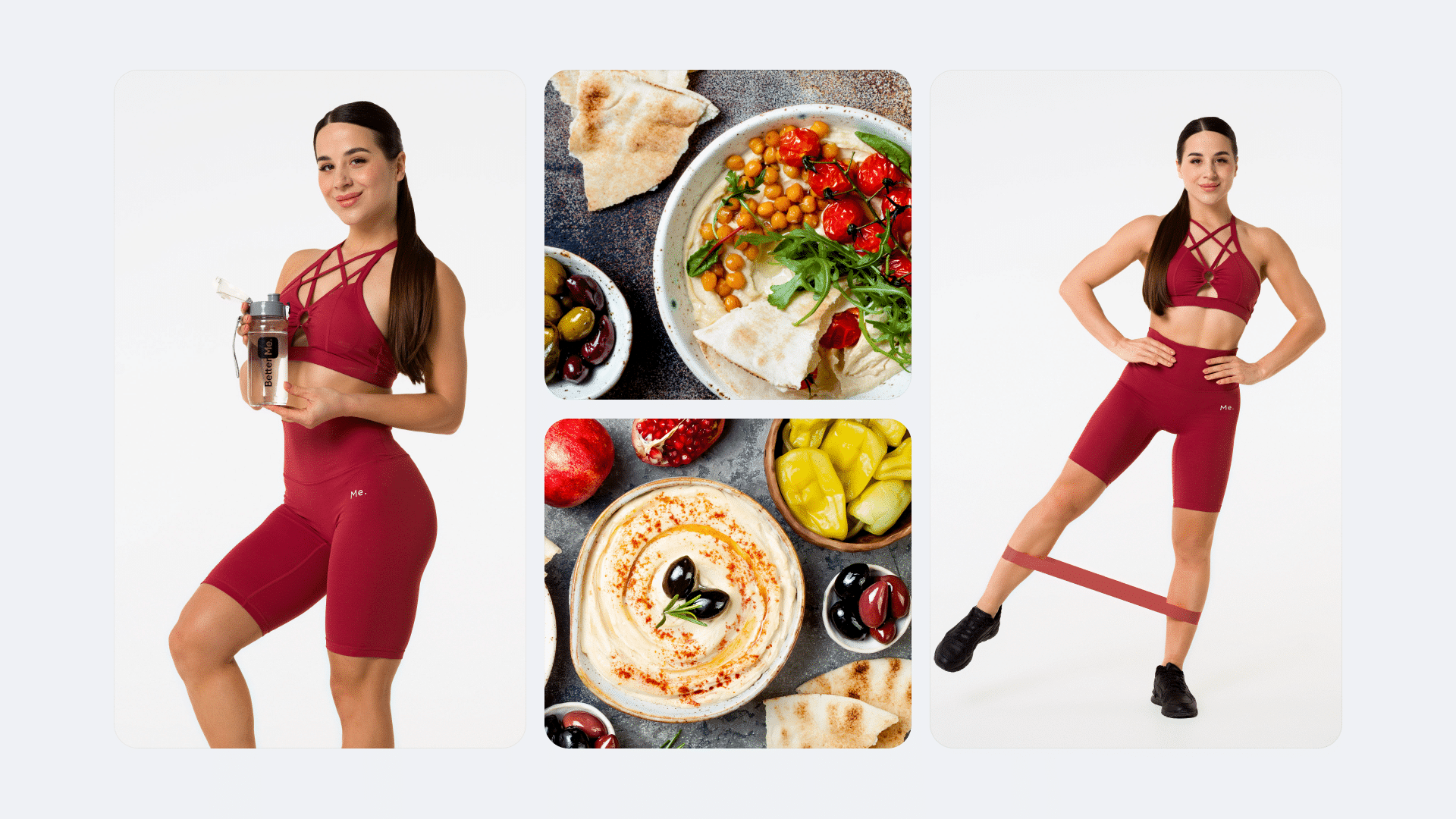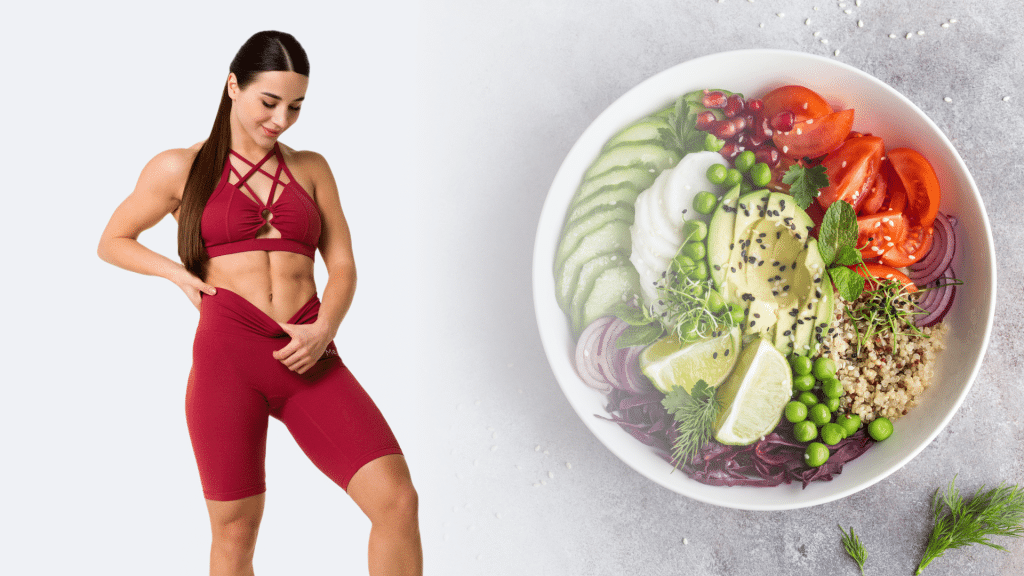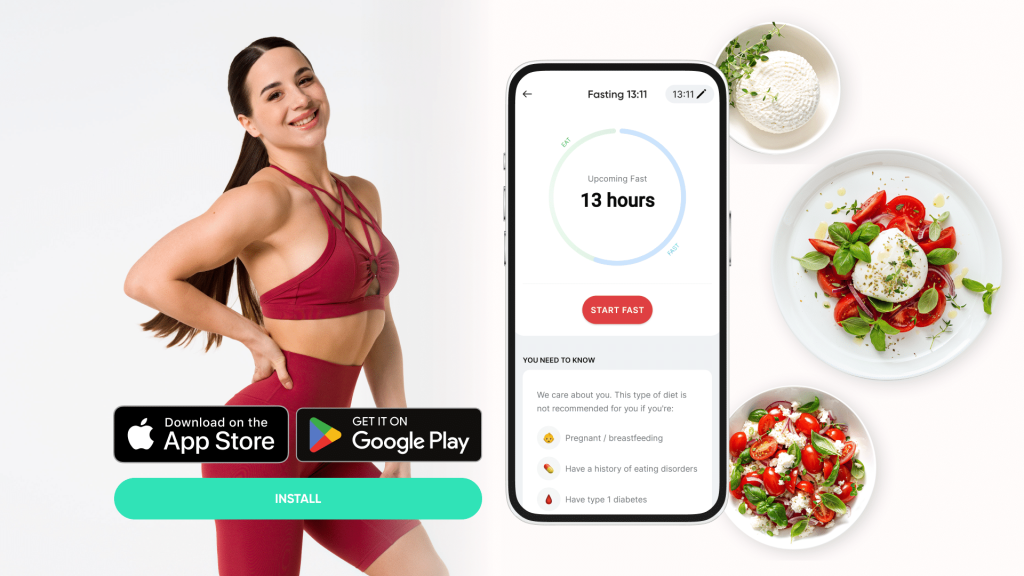Intermittent fasting and a vegan lifestyle have one thing in common—they’ve become increasingly popular in the last decade. And it’s easy to see why.
Research into intermittent fasting (IF) has found potential benefits such as improved metabolic health, increased longevity, and weight loss (26).
At the same time, several studies on veganism have highlighted the positive impact it can have on heart health, reducing the risk of some cancers, and contributing to a sustainable environment.
Therefore, combining the two for optimal health seems like a promising approach.
However, before you prepare your intermittent fasting vegan meal plan, it’s important to consider that not every dietary strategy is suitable for everyone. You should check whether this combination aligns with your nutritional needs, lifestyle, and wellness goals.
Here’s what you need to know.
Can You Use Intermittent Fasting on a Vegan Diet?
Yes, you can practice vegan intermittent fasting, but you must first have mastered the ins and outs of the vegan diet. Let’s explain this in more detail.
Adapting to a vegan diet is not as simple as removing animal products from your meals, it’s about understanding how to get all the nutrients you need from plant-based foods.
This means properly balancing your intake of macro and micronutrients, such as proteins, carbs, fats, vitamins, and minerals.
It also means understanding the concept of complete proteins and how you can obtain them from plant sources, which requires eating a variety of plant-based proteins throughout the day.
There is a steep learning curve with a vegan diet. You must figure out how you can replace animal-derived nutrients such as vitamin B12, omega-3 fatty acids, iron, calcium, and zinc, which are typically obtained from meat, eggs, and dairy (18).
These nutrients are essential for everything from maintaining energy levels and brain function to supporting your immune system and bone health.
If you’ve mustered up the courage to crush your weight loss goal, let Betterme take the sting out of this demanding process. Our app will help you restructure your habits, remold your life and crank up your fitness results!
Trying to master vegan intermittent fasting (IF) quickly could leave you feeling overwhelmed and at risk of failing to meet your nutrient requirements during your restricted feeding window.
For example:
- You may struggle to consume enough protein, particularly if you’re active as plant-based proteins are less dense than animal proteins.
- Legumes, nuts, seeds, whole grains, and some vegetables are excellent vegan sources of protein, but you need a variety to ensure you get all the essential amino acids.
- Iron is less bioavailable in plant-based foods and you may wish to pair iron-rich foods with vitamin C to enhance absorption.
- The same applies to omega-3 fatty acids, which although they are available in foods such as flaxseeds and walnuts, are not as efficiently converted into the active forms your body uses as those obtained from fish.
- Vitamins such as B12 and D are primarily found in animal products and you may need to purchase fortified foods or supplements.
Now, imagine trying to figure all this out while also confining your meals to a restricted feeding window in intermittent fasting.
It’s similar to juggling while learning to ride a unicycle—not impossible, but undoubtedly quite daunting! There’s a significant risk of failing to meet your nutrient requirements, which could ultimately lead to deficiencies.
Anybody who has been vegan for a while and has already navigated these dietary complexities is more likely to be successful when adopting IF combined with a plant-based lifestyle.
They’ll know how they can pack nutrient-dense meals into their feeding windows, which will ensure they satisfy their caloric and nutritional needs.
It’s important to remember that any diet, including vegan IF, is only as good as the nutrient quality it provides. It’s not just about eating less, but eating right! We have emphasized this concept in our Keto vs Intermittent Fasting post.
What Are The Benefits of Vegan Intermittent Fasting?
Combining the principles of a vegan diet with intermittent fasting can potentially offer a powerful mixture of benefits derived from both eating patterns.
This synergy may prove effective for achieving your health goals, depending on your unique physical needs and lifestyle.
There is limited research on the best intermittent fasting vegetarian diet, but based on what is known about a vegan diet and IF, it can be concluded that you may reap the following potential benefits:
1. Weight Loss
When following a vegan intermittent fasting lifestyle, weight loss may be one of the significant benefits you experience. This is because both veganism and IF can create a calorie deficit, which is essential for shedding unwanted pounds (26) (2).
For example, by consuming a well-planned intermittent fasting vegan meal plan, you’re confining your calorie intake to within a specific window, thereby promoting a calorie deficit without needing to count calories intensely.
In addition, due to the high fiber content of a vegan diet, you may feel full faster and for longer, which will help you reduce your overall food intake.
It’s important to bear in mind that initial weight loss may be more about losing water weight than actual fat, and consistent, long-term weight loss requires dedication and a balanced approach to your vegan intermittent fasting 20/4 or whichever IF routine you choose.
Several studies have found that vegans tend to have lower body weights and body mass indexes (BMIs) than non-vegans (3).
Research also shows that IF can be a successful weight loss strategy and can improve metabolic health (Patterson & Sears, 2017). For instance, a 2014 review found that studies on various IF regimens observed statistically significant weight loss ranging from 1.3% to 8% of body weight over 2-8 weeks (14).
How Much Weight Can You Lose In 3 Weeks on a Vegan Diet with IF?
Predicting exactly how much weight you can lose on a vegan diet with IF in three weeks is challenging, as this is largely dependent on individual factors such as starting weight, metabolism, physical activity level, and adherence to the diet.
A healthy and sustainable rate of weight loss is approximately 1-2 pounds per week (17). This means that in three weeks, you can expect to lose 3-6 pounds on a well-managed vegan IF diet when combined with regular physical activity.
This estimate may not sound as impressive as some crash diet promises, but remember, slow and steady often wins the race when it comes to sustainable weight loss.
Check out our post on vegan recipes for weight loss for ideas on what to eat to sustain weight loss.
Read more: 4 Vegan Breakfast Recipes That Prove You Don’t Need Eggs to Start Your Day
2. Improved Digestive Health
Some people feel that adopting a 7-day meal plan for intermittent fasting positively impacts their digestive health. The fasting windows give your digestive system a rest, and some people have reported that it reduces bloating and improves digestive symptoms, although relatively few studies have been conducted on this (15). In addition, a vegan diet is naturally rich in fiber, which promotes regular bowel movements and a healthier gut microbiome (24).
3. Increased Insulin Sensitivity
Another potential benefit of a vegan intermittent fasting lifestyle is increased insulin sensitivity, which can be beneficial for weight management and overall health. The fasting periods can help you lose weight and may also reduce inflammation, potentially lowering the risk of type 2 diabetes and other obesity-related diseases (26).
4. Heart Health Benefits
Combining a vegan diet with intermittent fasting may also contribute to heart health. For example, vegan diets are typically low in saturated fats, which are known to negatively impact heart health when they are consumed in excess (21).
Furthermore, the weight loss that is associated with IF can improve cardiovascular health markers such as blood pressure and cholesterol levels (16).
5. Enhanced Mental Clarity
Some followers of a vegan intermittent fasting lifestyle have reported enhanced mental clarity and concentration during fasting periods (26). This could be due to the fact that during fasting, the body starts to use fat for energy, which produces ketones – an alternative source of energy for the brain (5). However, this is mostly based on anecdotal evidence.
6. Potential for Longevity
Some studies have suggested that IF may contribute to an increased lifespan, although further research is needed in this area. However, the concept of ‘caloric restriction’ has been linked to longevity in multiple studies, and IF can be a way of achieving that (9).
7. Sustainability and Environmental Impact
Combining a vegan diet and intermittent fasting can also positively impact sustainability and the environment. A vegan diet uses fewer resources such as water and land in comparison to an omnivorous diet. In addition, many people find that intermittent fasting reduces food waste, as there is a lower likelihood of overbuying or overcooking.
What Is The Best Way for a Vegan To Break a Fast?
When breaking a fast as a vegan, it’s important to reintroduce food to your system gently. This process depends on the length of your fast. For short fasts, such as 16-24 hours, you can generally eat normally, but following longer fasts, like 48 hours or more, you should start with easily digestible foods.
We discussed 6 types of fasting in an earlier post, and you can find out more about fasting right there.
Here are 15 healthy vegan options to consider when breaking a fast:
Veggie Broth: Light, warming, and hydrating, vegetable broth is a great way of breaking a fast. It replenishes the system with vitamins and minerals without overwhelming the digestive system.
Fortified Plant Milk: Rich in essential nutrients such as calcium, vitamin D, and B12, fortified plant milk such as almond, soy, or oat milk can provide a gentle way to reintroduce sustenance to your body (22).
Fortified Plant Yogurt: Probiotic-rich and fortified with essential nutrients, plant yogurts support gut health while providing a gentle reintroduction of solid food to the digestive system (19).
Brazil Nuts: Known for their high selenium content, Brazil nuts may boost antioxidant activity in the body. They’re also an excellent source of healthy fats, which can help satiate hunger (8).
Chia Seed Pudding: Chia seeds are a powerhouse of fiber, omega-3 fatty acids, and protein. They aid digestion and provide slow-release energy (20). Soaking them in plant milk creates a pudding-like texture, which makes it an easy-to-digest option.
Avocados: Avocados are packed with healthy fats and fiber, and offer a satiating and nutrient-dense option to break a fast (1).
Quinoa: A high-protein, gluten-free grain, quinoa is an excellent source of complex carbohydrates for slow-release energy (13).
Bananas: Bananas are easily digestible and provide a natural sweetness. They are also rich in potassium, which helps replenish electrolyte levels (6).
Spinach: An excellent source of iron and calcium, spinach is a nutrient-dense choice that can easily be added to smoothies or salads (12).
Berries: Berries are high in antioxidants and fiber and offer a sweet yet low-calorie option to break a fast (7).
Sweet Potatoes: Roasted or steamed sweet potatoes provide a comforting, fiber-rich choice. They are loaded with beta-carotene, vitamin C, and magnesium (23).
Almonds: Offering a good balance of protein, fiber, and healthy fats, almonds can help regulate blood sugar levels (4).
Tofu: Tofu is high in protein and rich in essential amino acids and can be marinated and added to a variety of dishes (10).
Flaxseeds: Loaded with omega-3 fatty acids and fiber, flaxseeds can help maintain a healthy digestive system. They can easily be added to a smoothie or sprinkled on top of a salad (11).
Hummus: Made from chickpeas, hummus is high in protein and fiber and offers a tasty and nutritious option to break a fast (25).
If you tend to let yourself off the hook, raise the white flag when things get tougher than you expected, send yourself on an unconscious binge-eating trip – BetterMe app is here to help you leave all of these sabotaging habits in the past!
Sample 7-Day Meal Plan for Intermittent Fasting on a Vegan Diet
Let’s assume you’re practicing vegan intermittent fasting 16/8 (where you fast for 16 hours and eat in an 8-hour window) – although beginners may wish to start with shorter fasts such as 14/10 or 12/12.
In your 8-hour window, you’ll need to consume at least three incredibly nutrient-dense, satiating, and wholly plant-based meal options. You may not be able to eat large portions during this time, but that doesn’t mean you won’t be satiated.
Here’s a vegan intermittent fasting recipe plan:
Day 1
- Break Your Fast: slow-cooked vegetable broth
- Meal Option 1: quinoa salad with avocado, black beans, and mixed vegetables
- Meal Option 2: steamed sweet potato with a side of spinach and tofu stir-fry
- Snack Option 1: a handful of almonds and Brazil nuts
- Snack Option 2: a bowl of mixed berries with a dollop of fortified plant yogurt
- Zero Calorie Beverage Options (drink any of these throughout your fast): still water, sparkling water, unsweetened green tea, unsweetened black coffee (in moderation)
Day 2
- Break Your Fast: veggie broth with added nutritional yeast
- Meal Option 1: vegan lentil dal served with brown rice
- Meal Option 2: buckwheat noodles with stir-fried mixed vegetables and tofu
- Snack Option 1: hummus with whole-grain crackers
- Snack Option 2: chia seed pudding made with fortified plant milk
- Zero Calorie Beverage Options (drink any of these throughout your fast): still water, sparkling water, unsweetened green tea, unsweetened black coffee (in moderation)
Day 3
- Break Your Fast: fortified plant milk with a teaspoon of flaxseed
- Meal Option 1: vegan chickpea “tuna” salad sandwich
- Meal Option 2: vegan quiche made with tofu and a variety of vegetables
- Snack Option 1: banana with a handful of almonds
- Snack Option 2: a bowl of fresh berries
- Zero Calorie Beverage Options (drink any of these throughout your fast): still water, sparkling water, unsweetened green tea, unsweetened black coffee (in moderation)
Day 4
- Break Your Fast: veggie broth with added nutritional yeast
- Meal Option 1: vegan lentil soup with a side of whole-grain bread
- Meal Option 2: vegan paella made with brown rice, artichokes, bell peppers, and peas
- Snack Option 1: a handful of Brazil nuts
- Snack Option 2: flaxseed smoothie made with fortified plant milk and bananas
- Zero Calorie Beverage Options (drink any of these throughout your fast): still water, sparkling water, unsweetened green tea, unsweetened black coffee (in moderation)
Day 5
- Break Your Fast: a cup of warm fortified plant milk
- Meal Option 1: vegan stuffed bell peppers with quinoa and black beans
- Meal Option 2: vegan sweet potato shepherd’s pie
- Snack Option 1: chia seed pudding
- Snack Option 2: hummus with carrot sticks
- Zero Calorie Beverage Options (drink any of these throughout your fast): still water, sparkling water, unsweetened green tea, unsweetened black coffee (in moderation)
Day 6
- Break Your Fast: veggie broth with added nutritional yeast
- Meal Option 1: vegan Buddha bowl with avocado, chickpeas, quinoa, and mixed vegetables
- Meal Option 2: vegan spaghetti bolognese made with lentils
- Snack Option 1: a bowl of mixed berries with a dollop of fortified plant yogurt
- Snack Option 2: smoothie made with spinach, bananas, and fortified plant milk
- Zero Calorie Beverage Options (drink any of these throughout your fast): still water, sparkling water, unsweetened green tea, unsweetened black coffee (in moderation)
Day 7
- Break Your Fast: a cup of warm fortified plant milk
- Meal Option 1: vegan lentil salad with mixed vegetables and a tahini dressing
- Meal Option 2: vegan stir fry with tofu, brown rice, and a variety of vegetables
- Snack Option 1: a handful of almonds and Brazil nuts
- Snack Option 2: a bowl of fresh fruit, such as berries or bananas
- Zero Calorie Beverage Options (drink any of these throughout your fast): still water, sparkling water, unsweetened green tea, unsweetened black coffee (in moderation)
Read more: The Vegan Diet: How It Works, What to Eat, and the Benefits
Frequently Asked Questions
What doesn’t ruin intermittent fasting?
The consumption of zero-calorie beverages such as water, unsweetened tea, or black coffee will not ruin intermittent fasting.
These drinks can be consumed throughout the fasting period without breaking your fast. In addition, essential vitamins and supplements that do not contain sugars or proteins and activities such as exercise will not interrupt the fasting state.
Which type of intermittent fasting is most successful?
The 16/8 method of intermittent fasting, where you fast for 16 hours and consume food within an 8-hour window, is often considered to be the most successful. It’s popular due to its flexibility and ease of adherence.
The success of this method is largely attributed to its balance between fasting and eating periods, allowing for sustainable weight management and health benefits.
Is intermittent fasting the healthiest diet?
Intermittent fasting is not technically a “diet” in the traditional sense but an “eating pattern”. That being said, there is limited long-term data on its impacts. It’s also not suitable for everyone, particularly those with certain medical conditions or pregnant or breastfeeding women.
Therefore, although intermittent fasting has potential health benefits, it’s not inherently “the healthiest diet”. As with any eating pattern, individual profiles and needs must be considered, and you should seek professional health advice if necessary.
The Bottom Line
Vegan intermittent fasting is a popular dietary choice for those who are looking to lose weight or improve their overall health. It involves skipping meals and fasting for certain periods of time and eating vegan-friendly plant-based meals during a specific window of time.
To ensure success, you must be mindful of meal options, snacks, and beverages that can sustain the fasting period without your nutritional needs being compromised.
DISCLAIMER:
This article is intended for general informational purposes only and does not serve to address individual circumstances. It is not a substitute for professional advice or help and should not be relied on for making any kind of decision-making. Any action taken as a direct or indirect result of the information in this article is entirely at your own risk and is your sole responsibility.
BetterMe, its content staff, and its medical advisors accept no responsibility for inaccuracies, errors, misstatements, inconsistencies, or omissions and specifically disclaim any liability, loss or risk, personal, professional or otherwise, which may be incurred as a consequence, directly or indirectly, of the use and/or application of any content.
You should always seek the advice of your physician or other qualified health provider with any questions you may have regarding a medical condition or your specific situation. Never disregard professional medical advice or delay seeking it because of BetterMe content. If you suspect or think you may have a medical emergency, call your doctor.
SOURCES:
- Avocado consumption is associated with better diet quality and nutrient intake, and lower metabolic syndrome risk in US adults: results from the National Health and Nutrition Examination Survey (NHANES) 2001–2008 (2013,nih.gov)
- A plant-based diet for overweight and obesity prevention and treatment (2017,nih.gov)
- A two-year randomized weight loss trial comparing a vegan diet to a more moderate low-fat diet (2007,nih.gov)
- Almonds (Prunus Dulcis Mill. D. A. Webb): A Source of Nutrients and Health-Promoting Compounds (2020,nih.gov)
- Biochemistry, Ketogenesis (2023,nih.gov)
- Bananas (n,d,harvard.edu)
- Berries (hss.gov.nt.ca)
- Brazil nuts: Nutritional composition, health benefits and safety aspects (2017,nih.gov)
- Calorie restriction for enhanced longevity: The role of novel dietary strategies in the present obesogenic environment (2020,nih.gov)
- Clearing up questions on whether tofu is healthy (2022,nih.gov)
- Dietary Flaxseed as a Strategy for Improving Human Health (2019,nih.gov)
- Functional properties of spinach (Spinacia oleracea L.) phytochemicals and bioactives (2016,nih.gov)
- Healthy food trends — quinoa (2022,medlineplus.gov)
- INTERMITTENT FASTING AND HUMAN METABOLIC HEALTH (2016,nih.gov)
- Intermittent fasting and gut microbiota (2019,nih.gov)
- Intermittent Fasting: A Heart Healthy Dietary Pattern? (2020,nih.gov)
- Losing Weight (2023,cdc.gov)
- Nutrient Intake and Status in Adults Consuming Plant-Based Diets Compared to Meat-Eaters: A Systematic Review (2022,nih.gov)
- Nutritional Content and Health Profile of Non-Dairy Plant-Based Yogurt Alternatives (2011,nih.gov)
- Nutritional and therapeutic perspectives of Chia (Salvia hispanica L.): a review (2016,nih.gov)
- Plant-based diets and cardiovascular health (2018,nih.gov)
- Plant-based milk alternatives an emerging segment of functional beverages: a review (2016,nih.gov)
- Sweet Potato Is Not Simply an Abundant Food Crop: A Comprehensive Review of Its Phytochemical Constituents, Biological Activities, and the Effects of Processing (2022,nih.gov)
- The Effects of Vegetarian and Vegan Diets on Gut Microbiota (2019,nih.gov)
- The Benefits of Including Hummus and Hummus Ingredients into the American Diet to Promote Diet Quality and Health: A Comprehensive Review (2022,nih.gov)
- What is intermittent fasting? Does it have health benefits? (2018,mayoclinic.org)










